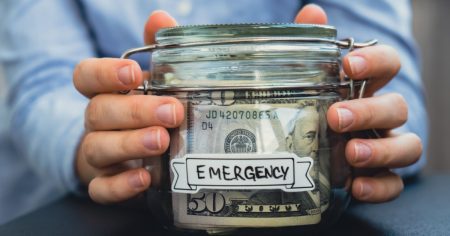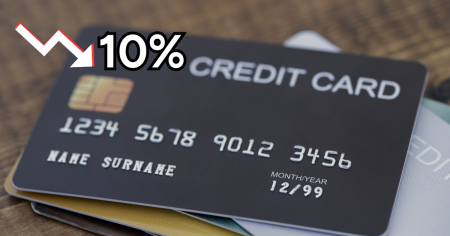Key Takeaways:
- Credit card debt reduces disposable household income
- Debt delays consumers’ ability to build wealth
- Credit card debt impacts physical and emotional health
- High credit card debt can put excessive strain on personal relationships
- High consumer debt impacts the national economy
What is The Economic Cost of High Consumer Debt?
Consumer debt has wide range of consequences for the economy and for individuals. When consumers use their disposable income to pay off debt, they are not making new purchases for goods or services. This effects our national economy since consumer spending makes up about 70% of the US GDP.
Debt Reduces Household Cash Flow
High-interest credit card debt impacts household income. Instead of saving for emergencies or retirement, households are stuck paying down interest charges. In fact, according to Cardrates.com, the average household is in $10,767 in credit card debt. Anyone with a credit card realizes that paying the minimum monthly payment while still using the credit card only makes the problem worse.
Debt Blocks Wealth-Building Goals
Carrying significant debt makes it harder to qualify for mortgages, auto loans, or small business credit. One of the best-known strategies for building generation wealth is homeownership. Many families delay homeownership or education plans because debt lowers credit scores and raises borrowing costs. Lenders look at the borrower’s debt to income ratio (DTI) to evaluate financial health. It compares how much you owe against vs. how much income you make each month. Most lenders want a DTI under 36%.
Minimum Payments Create a Debt Trap
Paying only the minimum stretches repayment timelines into decades. For example, $10,000 in credit card debt at 20% interest with minimum payments could take more than 25 years to pay off, costing double the original balance. If you are curious about your own debts use our debt payoff calculator to see the impact of paying just the minimum payment vs paying an extra amount.
Consumer Debt Hurts the Economy Too
When households devote income to debt instead of spending locally, businesses feel the impact. On a national level, rising defaults also raise the cost of lending for everyone, further straining the economy.
The Health and Emotional Impact of Debt
Debt Stress Is Real
Money is the number one source of stress for most Americans. This stress leads to sleepless nights, difficulty focusing, and decreased productivity at work. Research has shown that people with high levels of debt are more likely to experience stress that can become chronic and lead to very serious physical and emotional issues.
Physical Health Risks
Chronic financial stress has been linked to high blood pressure, heart disease, and weakened immunity. Many people struggling with debt also report delaying or skipping medical care and prescriptions because of financial strain. Sleep often becomes difficult when every moment is filled with worry.
Some common physical symptoms include:
- Headaches and migraines – Stress often causes tension in the neck and shoulders, leading to frequent headaches.
- High blood pressure – Chronic stress can elevate blood pressure and strain the heart.
- Digestive problems – From upset stomachs to more serious issues like ulcers or irritable bowel syndrome (IBS), stress can wreak havoc on your gut.
- Muscle pain or tightness – Your body tenses in response to stress, which can lead to chronic pain or fatigue.
- Weakened immune system – Prolonged stress can make you more susceptible to illness.
- Fatigue – Constant worry drains your mental and physical energy.
- Increased risk of heart disease – Over time, unmanaged stress can contribute to heart issues, including heart attacks and strokes.
Debt and Mental Health
Debt is strongly correlated with depression and anxiety. Feelings of shame, guilt, or hopelessness can worsen mental health challenges and make it harder to seek help.
Some of the most common psychological symptoms of struggling with excessive debt include:
- Anxiety and panic attacks – Persistent worry about finances can trigger racing thoughts and even physical symptoms like shortness of breath or a pounding heart.
- Depression – Feeling stuck or hopeless about your financial situation can lead to a low mood, a lack of motivation, or even despair.
- Irritability and mood swings – Financial tension can make it harder to regulate emotions, leading to outbursts or increased conflict with others.
- Sleep disturbances—It’s hard to rest when your mind is racing through unpaid bills and mounting credit debt.
- Feelings of shame or guilt – Many people internalize their financial struggles, leading to low self-esteem or embarrassment.
- Social withdrawal – Some people begin isolating themselves to avoid uncomfortable conversations or spending money.
- Difficulty concentrating – When constantly stressed about money, it can be hard to focus on work or in daily life.
Debt Strains Relationships
Financial disagreements about credit card debt can lead to conflict, mistrust, and put long-term strain on family and social relationships. Beyond that, people struggling with debt often carry heavy feelings of personal failure. But the truth is, many factors like medical emergencies, job loss, inflation, or caring for a loved one can trigger financial crises. Debt isn’t a moral failing. It’s a challenge that can be faced and overcome with the right support.
How Can I Get Out of Credit Card Debt?
The good news: there are proven ways to take control.
- Budget smarter: Track income and expenses, cut unnecessary costs, and prioritize high-interest debt first.
- Professional credit counseling: ACCC is a nonprofit credit counseling agency, and we offer free sessions to help consumers understand their options. We also offer Debt Management Plans (DMPs) if applicable which combine multiple payments into one lower-interest plan, making it easier to become debt-free.
- Healthy coping strategies: Stress management, support networks, and open conversations about money can reduce the emotional toll of debt.
Debt Doesn’t Have to Control Your Life
Consumer debt impacts both financial stability and overall health—but it doesn’t have to define your future. With the right plan and professional support, you can break the cycle and move toward financial freedom.
Take the first step today. Contact American Consumer Credit Counseling for a free credit counseling session and discover real solutions to get out of debt.
Frequently Asked Questions
Q: What is high credit card debt?
A: If your balances are more than 15-20% of your annual income, many financial experts consider that high credit card debt.
Q: What is the average US Credit Card balance in 2025?
A: The Average US Credit Card balance is approximately $7,300.00
Q: How does credit card debt affect my credit score?
A: Credit card debt affects your credit score by raising your credit utilization and risking late payments, both of which can significantly lower your score.
Q: What happens if I only make minimum payments on my credit cards?
A: Making minimum payments keeps your account current, but most of your payment goes to interest. This means it can take decades to pay off balances, and you’ll pay far more than you originally borrowed.
Q: Does credit card debt ever go away on its own?
A: No interest keeps compounding, which makes balances grow if you’re not paying more than the minimum. Without a repayment plan, debt can become unmanageable.
Q: When should I seek help from a nonprofit credit counseling agency for my debt?
A: If you are struggling to make your minimum payments, feeling overwhelmed or stressed, it is time to reach out.
Read the full article here









